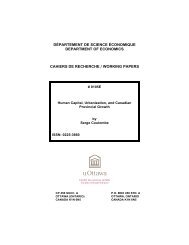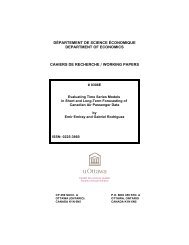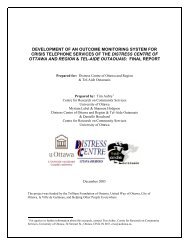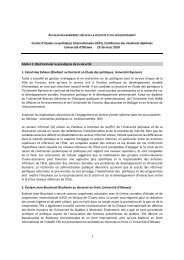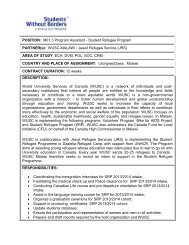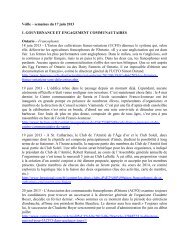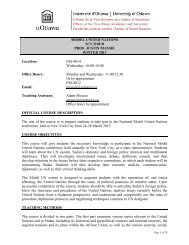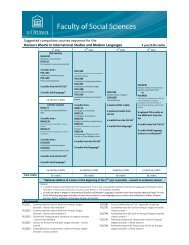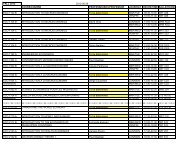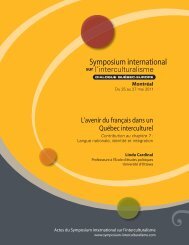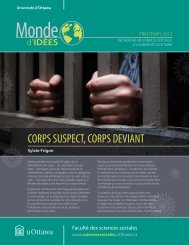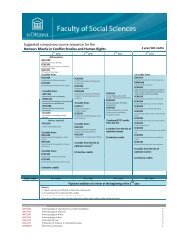Full text - Faculty of Social Sciences - Université d'Ottawa
Full text - Faculty of Social Sciences - Université d'Ottawa
Full text - Faculty of Social Sciences - Université d'Ottawa
You also want an ePaper? Increase the reach of your titles
YUMPU automatically turns print PDFs into web optimized ePapers that Google loves.
166 IPC Review 3 Strategy to Engage Regional Government in the Prevention <strong>of</strong> Violence Against Women 167<br />
PCSA’s goal is to enhance interagency and community co-operation and<br />
collaboration and to promote, enhance and maintain a continuum <strong>of</strong> education,<br />
prevention, service delivery, research and social change initiatives. PCSA<br />
operates as a community collaborative and has 25 signatory members. Like<br />
PCAWA, the core operations consist <strong>of</strong> networking, advocating for increased<br />
and supplemental funding, raising public awareness through education and<br />
outreach campaigns, community development, and building the organizational<br />
capacity <strong>of</strong> the membership. It is currently staffed by one full-time coordinator<br />
and one part-time administrative assistant. Contingent on project funds,<br />
consultants are occasionally hired to work on specific initiatives.<br />
PCAWA and PCSA operate from a common framework that provides a<br />
foundation for understanding issues and experiences, and also serves as a tool<br />
for problem-solving. The Integrative Feminist Anti-Racism/Anti-Oppression<br />
Framework is an approach that is woman-centred and focuses on the lives<br />
and realities <strong>of</strong> women and marginalized people. It affirms women’s right to<br />
contribute to, and to determine, the social, political and economic changes<br />
in their lives. It affirms their right to safe spaces in the groups, agencies, and<br />
institutions they encounter in their lives. This framework also recognizes that<br />
racism and oppression are systemic within our institutions, both formally and<br />
informally, intentionally and unintentionally. It recognizes that power and<br />
privilege exist and that these are based on skin colour, sexual orientation, class,<br />
gender, age, faith, and ability, and that these privileges are institutionalized<br />
and help maintain unequal relationships between people and groups. An<br />
Integrative Feminist Anti-Racism/Anti-Oppression Framework recognizes that,<br />
while violence against women cuts across all communities <strong>of</strong> women, it always<br />
happens in a social and historical con<strong>text</strong>.<br />
This framework is further supplemented by an intersectional approach<br />
(Crenshaw, 1994) that analyzes how gender, race, class, sexuality and other<br />
social and cultural identities intersect to create a system <strong>of</strong> multiple forms <strong>of</strong><br />
oppression. This requires that members <strong>of</strong> both collaboratives also consider their<br />
own lives in the light <strong>of</strong> an intersectional framework, to see who they are, how<br />
they are connected and how they are also participants in systems <strong>of</strong> oppression.<br />
It is important to recognize that the process <strong>of</strong> developing and fostering this<br />
understanding is complex and transformative, and it can be challenging to<br />
make the necessary changes to move towards more equitable systems and<br />
relations. This framework, and the insistence that women and girls must be<br />
distinctly named and included in any crime prevention initiative, are the rudder<br />
that steers the collaboratives in their work, whether internally, within partner<br />
agencies, amongst the community or when engaging in political consultation.<br />
Groundwork with Peel Municipal/Regional Government<br />
The PCAWA and PCSA have been around long enough to build trusting<br />
relationships with regional partners. The Region <strong>of</strong> Peel was an early supporter<br />
<strong>of</strong> collaborative work and <strong>of</strong> the community working together to end woman<br />
abuse, and participates in a number <strong>of</strong> work groups and community projects<br />
in areas such as public health, sexual health, housing, Ontario Works, mental<br />
health, childcare, early child development, youth, and police services.<br />
The Region has contributed directly to the governance <strong>of</strong> both collaboratives<br />
through the allocation <strong>of</strong> staff representatives and financial resources.<br />
Furthermore, the Region <strong>of</strong> Peel currently provides core financial support to<br />
PCAWA, which illustrates the value the Region places on the outcome-based<br />
and community-driven model <strong>of</strong> work adopted and practised by PCAWA.<br />
This level <strong>of</strong> participation has ensured that the collaboratives receive current<br />
information on related regional programs and have direct access to some <strong>of</strong> the<br />
supports and resources <strong>of</strong>fered by the Region. There have been many successful<br />
partnership projects over the past twenty years between the Region <strong>of</strong> Peel and<br />
the two collaboratives, some <strong>of</strong> which are still in place. One such example is<br />
the Building Blocks Project, which developed an anti-violence resource for<br />
service providers and parents to use with children. Member organizations <strong>of</strong><br />
the collaboratives, including the Region <strong>of</strong> Peel’s Public Health Department,<br />
participated in its development and production. More recently (and four years<br />
after its initial production), the Public Health Department reached out to the<br />
collaboratives in order to revise the tool and reproduce and redistribute it to<br />
the community. Another successful undertaking was the partnership created<br />
between the Region <strong>of</strong> Peel’s Public Health Department and the collaboratives<br />
to provide awareness raising and educational initiatives to service providers in<br />
Peel on the topic <strong>of</strong> sex work. This also resulted in the adoption <strong>of</strong> new protocols<br />
within both the PCSA and PCAWA for the inclusion <strong>of</strong> sex trade workers.<br />
Yet, despite the longstanding relation between the collaboratives and the<br />
Region, and some successful ventures, a pattern <strong>of</strong> unidirectional influence was<br />
apparent. The Region’s support was largely financial, advisory and in the form<br />
<strong>of</strong> staff support for working groups, making the collaboratives the recipients<br />
<strong>of</strong> support and information from the Region. There was no forum through<br />
which the expertise or equity-based philosophy <strong>of</strong> the collaboratives could be<br />
captured in any Regional planning or programming. In 2006, participation in<br />
a national project and in a United Nations Conference would be the catalyst<br />
for monumental change in Peel.



